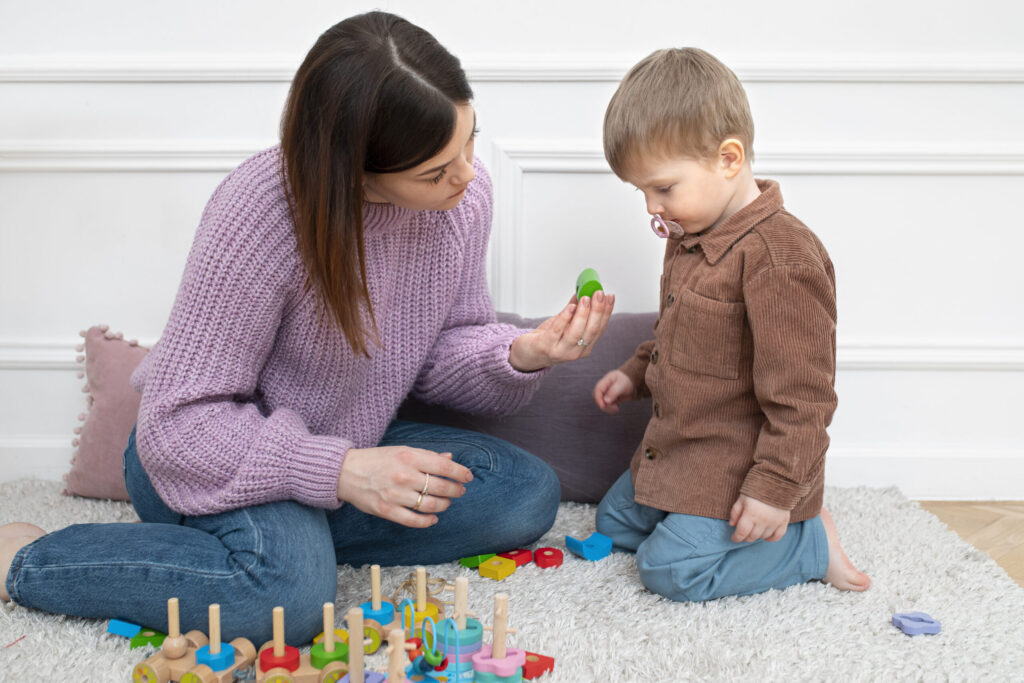What is developmental delay in toddlers?
Developmental delay is a delay in one or more areas of a child’s (birth-18) development. The areas of a child’s development include their physical, cognitive, intellectual, social, emotional, and speech and language development.
Delay in any one of these areas, or across these areas may indicate a more serious issue or cause, than just the delay itself. We must learn how to identify developmental delay, and its causes, early in the life of a child, or as early as we can – to ensure early intervention and support. Early intervention can sometimes help correct a delay, or at least ensure better support in managing a serious, life-affecting developmental delay.
A developmental delay that a toddler does not grow out of, or which does not improve or become acquired with professional intervention, will become a developmental disability – meaning a permanent developmental issue.
There are clear developmental milestones concerning the development of a toddler. These are usually organized by area of development and age. Within the age expectations for each area of development, or developmental skill, there may be a range within which a child might be expected to meet those milestones.
For example, for infants to acquire the skill of walking, the developmentally appropriate age range for acquiring this skill is between 9-18 months. There may be some concern about an infant not walking independently by the age of 14-15 months, but generally, a delay would not be diagnosed until later, around 16-18 months.
When we talk about development in a toddler we are talking about children aged from 1-3 years. This is the age following early infancy and before the start of early childhood.
What does developmental delay look like in toddlers?
Developmental delay in children can look like different things in different children. Some toddlers may experience delay in just one area of their development, say their speech and language, while others may experience delay across two different areas of their development. However, there are some clear examples of developmental delay in toddlers that can help parents understand their child’s development.
- Physical and gross motor skills development
One of the most anticipated physical skills toddlers acquire is that of walking. Walking symbolizes a degree of independence that places a child firmly on the path to toddlerhood, and marks the end of their infancy. It is a skill many parents watch for and monitor closely.
However, what is normal when it comes to the age at which toddlers first learn to walk independently can vary greatly. Some walk as infants, before 12 months, some walk right on their first birthdays, and some take a little longer. There are many factors at play influencing when a toddler takes their first steps – those with parents who walked later, are also more likely to take longer to take those first independent steps, and infants who are not given the space and opportunities to develop their physical skills and to move, may also walk later. Generally, if a toddler is not walking by between 16-18 months, parents should consult a medical professional, either their pediatrician or a child development specialist.
By itself, delayed walking may not be indicative of a more serious issue or cause. But if a toddler has also displayed physical developmental delay throughout their infancy – with rolling over, with learning to sit without assistance – there may be more cause for concern and further investigation. If this delay is also accompanied by low muscle tone, floppiness in general, or muscle stiffness, there may also be cause for further investigation.
2. Emotional and social skills development
Toddlerhood marks a time of significant growth of a toddler’s social and emotional skills. This is the age at which they begin to show an interest in communicating, interacting, and playing with others. Any signs that they are keen to engage in only solo or solitary play or any issues they seem to have with communicating with others, either in verbal or non-verbal ways, may suggest an emotional or social delay.
A toddler who is reluctant to show emotion towards family members – siblings and parents – may be showing signs of a delay in this area of their development. There is a fine line between normal toddler development, and the unique personality of toddlers, some just are less social in the same way that adults can be more social, or not.
However, a toddler who displays continued signs of social and emotional delay, including difficulties holding a two-way conversation or communication, a toddler who responds out of proportion to sudden or minor changes in routine, and an inability to read and respond to simple social cues, may require further diagnosis and possible support.
3. Speech and language skills development
There are several speech and language skills toddlers are expected to master, and a lack of these may suggest a delay in this specific area of their development. During the toddler years, children will be expected to increase their vocabulary – both in terms of those words they can understand, and those they can speak and use. They will also be expected to display increasingly complex speech and language patterns – the use of longer sentences, questions, and other figures of speech. They will also be expected to use speech and language to communicate with others, and to be able to use it to express themselves.
Some children are naturally late talkers, and as long as they display solid non-verbal communication skills and comprehension skills – their speech will more than likely catch-up. Some children are exposed to less language at home or are exposed to multiple languages, which can lead to late talking. Speech and language delay is more serious and more complex, however. A toddler who shows limited comprehension skills, and is unable to follow simple, one-step instructions, may be experiencing a language delay.
4. Cognitive and intellectual skills development
The toddler years are a time of massive brain development. During this time toddlers learn to understand new concepts and to demonstrate their thinking and comprehension skills. Examples of these skills include counting, identifying shapes, being able to solve simple puzzles, problem-solving, and other important and age-appropriate cognitive skills. Toddlers who struggle with early reasoning and problem-solving skills and activity may have a cognitive delay. However professional assessment is necessary to understand if this is the case and the potential extent of the delay.
The causes
Developmental delay in toddlers may be the result of several factors. Sometimes it is a case of not enough mental and physical stimulation in their home or care environment. Other times it may be a case of neglect or abuse.
Severe developmental delay can also be caused by a rare disease or genetic syndrome. Angelman syndrome and Down syndrome may both present with developmental delays. If there is a suspected link between developmental delay in a toddler and a rare disease as a cause of the delay, then a referral should be made to a genetic counselor.
A genetic counselor can explain the possible and potential link between developmental delay if diagnosed, and a rare disease. Usually, a rare disease will also present with other symptoms – unique facial features, and health conditions, alongside developmental delay, and a genetic counselor can understand all of these within the context of a rare disease diagnosis.
Developmental delay in toddlers may be simply a case of a child needing time to catch up or additional support with developing a skill. In the case of a severe delay, may be further investigation required to understand the cause and possible support options.



